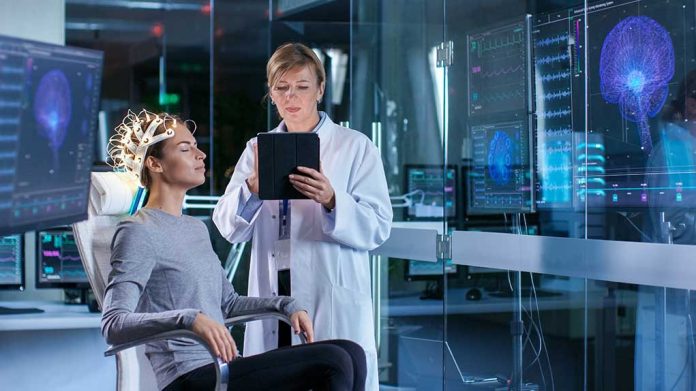
Hold onto your stars and stripes, fellow patriots! The future of American innovation is here, and it’s nestled snugly inside the skulls of two brave volunteers. Elon Musk’s Neuralink has just implanted its second human guinea pig—er, trial participant—with a brain chip that promises to revolutionize how we interact with technology. But before you start worrying about government mind control or accidentally tweeting your deepest secrets, let’s dive into what this really means for the land of the free and the home of the brave.
The Trailblazers: First and Second Implant Recipients
Neuralink’s journey into the human brain began with Noland Arbaugh, a quadriplegic who became the first recipient of the brain-computer interface. This groundbreaking technology aims to help paralyzed patients control digital devices through thought alone.
The success of Arbaugh’s implant paved the way for a second patient, also with a spinal cord injury, to receive the device. While details about this second participant are limited, the implications of their experience are monumental for the advancement of neurotechnology.
Redefining the boundaries of human capability requires pioneers.
If you have quadriplegia and want to explore new ways of controlling your computer, we invite you to participate in our clinical trial. pic.twitter.com/svqfAkVV1M
— Neuralink (@neuralink) May 16, 2024
Technological Advancements and Challenges
The second implant seems to have gone more smoothly than the first, with Elon Musk himself stating, “I don’t want to jinx it, but it seems to have gone extremely well with the second implant.”
However, it’s important to note that the journey hasn’t been without its hurdles. The first implant faced issues with retracting wires post-surgery, a problem that Neuralink was aware of from animal trials. This challenge was later addressed by modifying the implant’s algorithm.
Patient Experiences and Quality of Life
For Noland Arbaugh, the first recipient, the impact of the Neuralink device has been life-changing. “I didn’t have anything to wake up for in the morning, and this has changed that for me,” Arbaugh shared in an interview with Good Morning America.
This newfound independence and sense of purpose highlight the potential of Neuralink’s technology to dramatically improve the lives of those with severe disabilities. As for the second patient, while specific details are not yet available, the successful implantation marks another crucial step forward in this groundbreaking research.
Future Prospects and Ongoing Development
Neuralink isn’t resting on its laurels. The company is actively developing more efficient devices and exploring new applications, such as the Blindsight project aimed at helping blind individuals see. These advancements, coupled with planned improvements in surgical techniques, signal a promising future for brain-computer interfaces.
“In upcoming implants, our plan is to sculpt the surface of the skull very intentionally to minimize the gap under the implant … that will put it closer to the brain and eliminate some of the tension on the threads,” explained Matthew MacDougall, Neuralink’s head of neurosurgery.
As Neuralink continues to refine its technology and expand its clinical trials, the experiences of these first two patients will be invaluable in shaping the future of neurotechnology. For now, we can only watch and wait as American ingenuity once again pushes the boundaries of what’s possible in medicine and technology.
Sources
- https://nypost.com/2024/08/04/tech/neuralink-implanted-second-trial-patient-with-brain-chip-musk-says/
- https://www.theguardian.com/technology/article/2024/jul/11/neuralink-brain-implant
- https://www.wsj.com/tech/neuralink-gets-fda-green-light-for-second-patient-as-first-describes-his-emotional-journey-a2707584
- https://www.cnn.com/2024/05/17/tech/neuralink-trial-participant-elon-musk-noland-arbaugh/index.html
- https://www.reuters.com/science/us-fda-clears-neuralinks-brain-chip-implant-second-patient-wsj-reports-2024-05-20/
- https://www.bloomberg.com/news/articles/2024-06-28/neuralink-surgery-postponed-for-brain-implant-startup-s-second-patient
- https://www.reuters.com/business/healthcare-pharmaceuticals/neuralinks-first-human-patient-able-control-mouse-through-thinking-musk-says-2024-02-20/
- https://qz.com/elon-musk-neuralink-second-patient-1851487989
- https://www.theguardian.com/technology/article/2024/may/09/neuralink-brain-chip-implant
- https://www.businesstoday.in/technology/news/story/elon-musks-neuralink-implants-brain-chip-in-second-human-patient-440103-2024-08-05
More From Around the Web:
Neuralink: Beginner’s Guide to Human Clinical Trials
First Neuralink Patient Leaves Audience Speechless
First Human Subject With Neuralink in This First Human Trial Broadcast on X
Neuralink Begins Second Human Trials
Tweets:
Redefining the boundaries of human capability requires pioneers.
If you have quadriplegia and want to explore new ways of controlling your computer, we invite you to participate in our clinical trial. pic.twitter.com/svqfAkVV1M
— Neuralink (@neuralink) May 16, 2024
We’ve just passed 100 days since the first participant in our clinical trial received his Neuralink implant. Read our latest progress update here: https://t.co/7lckGYCK1H
— Neuralink (@neuralink) May 8, 2024
We’re excited to announce that recruitment is open for our first-in-human clinical trial!
If you have quadriplegia due to cervical spinal cord injury or amyotrophic lateral sclerosis (ALS), you may qualify. Learn more about our trial by visiting our recent blog post.…
— Neuralink (@neuralink) September 19, 2023
Neuralink has gotten approval from the FDA to install a brain implant in a second patient, as part of its initial clinical trial.
The first patient has also talked about his experience with the brain implant so farhttps://t.co/InH4d6Dsyj by @zacharyvisconti
— TESLARATI (@Teslarati) May 20, 2024










